The latest in the endless procession of quizzes is the
Personality Defect Quiz. This oone confirms
the earlier Which Saint Are You? Quiz, which said I am St. Julian of Norwich and described me as a Closet Hippie. Now this quiz wants to bring me out of the closet proclaiming that I am a:
Hippie
You are 28% Rational, 71% Extroverted, 28% Brutal, and 42% Arrogant.
You are the Hippie! Characterized by a strong sense of extroversion, irrationality, gentleness, and humility, you no doubt frolic through fields preaching peace and love to all!

You are probably either very spiritual or needlessly paranoid about "the man", like most hippies, as a result of your focus on intuition and feelings over cold, brutal logic. You are also very, very social. And like any hippie, who would have no qualms about hitchiking across the country just to meet some interesting people, you too love to interact with others, even complete strangers. Because we know most any hippie is peace-loving and humble, it stands to reason that you, as well, are terribly gentle and humble, almost to the point of revulsion. Your carefree attitude of peace and harmony is probably very, very sickening to realists or cynics or anyone who isn't a hippie, to tell the truth. In short, your personality is defective because you are overly emotional, extroverted, gentle, and humble--thus making you an annoying hippie.
To put it less negatively:
1. You are more INTUITIVE than rational.
2. You are more EXTROVERTED than introverted.
3. You are more GENTLE than brutal.
4. You are more HUMBLE than arrogant.
Compatibility:
Your exact opposite is the Sociopath.
Other personalities you would probably get along with are the Hand-Raiser, the Televangelist, and the Robot.
Take the test yourself:
The Personality Defect TestBut before you take this quiz, which wants to name your personality defects, remember
"Long ago, even before he made the world, God loved us and chose us in Christ to be holy and without fault in his eyes."—Ephesians 1:4
God desires for each of us to be made perfect in him, through an ongoing process the church calls sanctification, which simply means conforming your life to be more like Jesus' life. It's a slow process, and one greatly aided by reading the Bible, praying, and worshipping together each week with fellow Christians. In the archives, you will find a religion column
Salvation is only the beginning which goes into this more. There is also the audio for a sermon called
Pop Tarts and Pickels.
Perhaps, this process will work my hippiness out of me. Or will everyone else become more of a Hippie?
peace,
Frank+
The Rev. Frank Logue, Pastor +
King of Peace Episcopal Church

Pilgrimage or migration can be a dangerous undertaking. I suspect many Monarchs never make it to their destination. But the alternative is certain death - at least for the Monarch.
 It is both true and truly amazing that God become human in the form of Jesus of Nazareth and showed his power chiefly through showing mercy and pity. Jesus proved his power through his willingness to be powerless. This paradox is so counter to how we humans expect things to be. (Some thoughts on the paradoxical nature of Jesus' power is found on the page about "The Lamb of God" in the handout from last night's class on Revelation at
It is both true and truly amazing that God become human in the form of Jesus of Nazareth and showed his power chiefly through showing mercy and pity. Jesus proved his power through his willingness to be powerless. This paradox is so counter to how we humans expect things to be. (Some thoughts on the paradoxical nature of Jesus' power is found on the page about "The Lamb of God" in the handout from last night's class on Revelation at 
 n old couple were admired by everyone in the village for the happiness of their marriage. They never quarreled, and were always loving and affectionate toward each other. Eventually the husband died, and the wife was overcome with grief. Her children and her neighbors tried to console her, but to no avail. Weeks and months passed, and still the old woman was grieving and inconsolable; tears of grief rolled down her cheeks from morning till night.
n old couple were admired by everyone in the village for the happiness of their marriage. They never quarreled, and were always loving and affectionate toward each other. Eventually the husband died, and the wife was overcome with grief. Her children and her neighbors tried to console her, but to no avail. Weeks and months passed, and still the old woman was grieving and inconsolable; tears of grief rolled down her cheeks from morning till night. omgan heard about her. He asked one of his wealthy friends to lend him a ring with a precious jewel set in it. He took it to the old woman, and said to her, "I want you to find a family which has no sorrows, and give that family this ring."
omgan heard about her. He asked one of his wealthy friends to lend him a ring with a precious jewel set in it. He took it to the old woman, and said to her, "I want you to find a family which has no sorrows, and give that family this ring." he woman set off in search of a family with no sorrows. She visited every home in the region and talked to every family. Finally she returned home, and gave the ring back to Comgan. Her grief had gone.
he woman set off in search of a family with no sorrows. She visited every home in the region and talked to every family. Finally she returned home, and gave the ring back to Comgan. Her grief had gone.

 In other words, A.L. was so focused on the numbers, on getting it right, that he missed the dance—the joy of the dance, the beauty of the dance, and whom he was dancing with. Giving to God should not be about counting the steps, but about enjoying the dance. How are we doing? The tithe (10%) is not meant to be a stumbling block, but as a reference to help us determine if we are truly enjoying the dance, or if we are standing by the punch bowl.
In other words, A.L. was so focused on the numbers, on getting it right, that he missed the dance—the joy of the dance, the beauty of the dance, and whom he was dancing with. Giving to God should not be about counting the steps, but about enjoying the dance. How are we doing? The tithe (10%) is not meant to be a stumbling block, but as a reference to help us determine if we are truly enjoying the dance, or if we are standing by the punch bowl.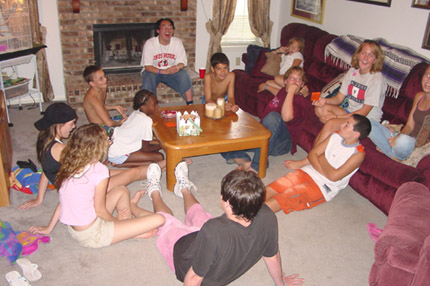


 This is probably true in all areas of ministry. A retired bishop who taught theology at my seminary says, "The incarnation is not virtual reality." Jesus really came in the flesh and ministry happens when people get together. Small groups at the church formed for any purpose can become places of ministry as people get to know one another, whether they first got together to prepare the altar for worship or to have a Bible Study. There is no shortcut for getting together, getting to know one another, and then seeing what happens. Ministry occurs naturally this way, rather than being forced.
This is probably true in all areas of ministry. A retired bishop who taught theology at my seminary says, "The incarnation is not virtual reality." Jesus really came in the flesh and ministry happens when people get together. Small groups at the church formed for any purpose can become places of ministry as people get to know one another, whether they first got together to prepare the altar for worship or to have a Bible Study. There is no shortcut for getting together, getting to know one another, and then seeing what happens. Ministry occurs naturally this way, rather than being forced. 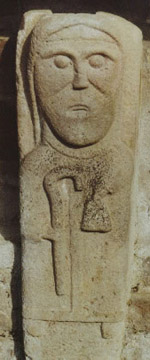 One of the great treasures within the Christian tradition are the sayings of the monks (male and female) who lived in the desert of Egypt during the 4th century. The teachings of these earliest of Christian monks come to us in short sayings. Here are two from collection edited by Thomas Merton called The Wisdom of the Desert.
One of the great treasures within the Christian tradition are the sayings of the monks (male and female) who lived in the desert of Egypt during the 4th century. The teachings of these earliest of Christian monks come to us in short sayings. Here are two from collection edited by Thomas Merton called The Wisdom of the Desert.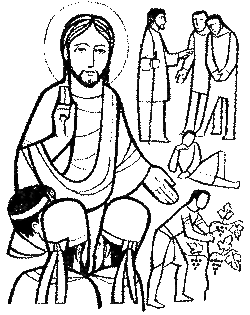 A Christian missionary in the Middle East used to share this parable about the two sons (only verses 28-30) with villagers that he visited and ask: "Which was the better son?"
A Christian missionary in the Middle East used to share this parable about the two sons (only verses 28-30) with villagers that he visited and ask: "Which was the better son?" 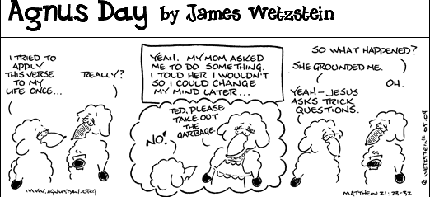
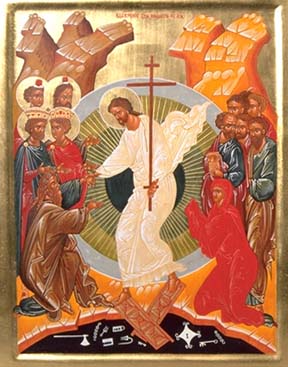 So what do I believe actually happened that morning on the third day after he died?
So what do I believe actually happened that morning on the third day after he died?
 Maybe we're meant to use apocalyptic literature in the same way: not as an allowance to indulge in an otherwordly fixation but as an injunction to pay closer attention to the world around us. When I find I am disturbed by the images of apocalypse, I find it helpful to remember the words of the fourth-century monk about the task of reading scripture as "working the earth of the heart," for it is only in disturbed, ploughed up ground that the seeds we plant for grain can grow.
Maybe we're meant to use apocalyptic literature in the same way: not as an allowance to indulge in an otherwordly fixation but as an injunction to pay closer attention to the world around us. When I find I am disturbed by the images of apocalypse, I find it helpful to remember the words of the fourth-century monk about the task of reading scripture as "working the earth of the heart," for it is only in disturbed, ploughed up ground that the seeds we plant for grain can grow.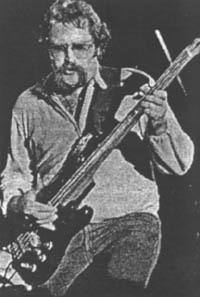 It was back as Church of the Spirit was just starting when we met Wade at a wedding for one of our friends. He played with the rest of the House of Spirit Band that day, and we asked him to return on Sunday. That started a process through which Wade both gave up cocaine and gave his life to Jesus. It began in a hospital room as doctors told Wade they might have to take off his arms. That's hard news, especially for a musician who makes his living and expresses himself through his arms and hands.
It was back as Church of the Spirit was just starting when we met Wade at a wedding for one of our friends. He played with the rest of the House of Spirit Band that day, and we asked him to return on Sunday. That started a process through which Wade both gave up cocaine and gave his life to Jesus. It began in a hospital room as doctors told Wade they might have to take off his arms. That's hard news, especially for a musician who makes his living and expresses himself through his arms and hands.  But he kept coming back to services, even when we did not have him scheduled to play with the band. Not long after, he came up to Pastor Roger in tears and asked to be baptized. He has stayed with us and played for us ever since.
But he kept coming back to services, even when we did not have him scheduled to play with the band. Not long after, he came up to Pastor Roger in tears and asked to be baptized. He has stayed with us and played for us ever since. Back in 2002, Wade wrote an open letter to the congregation in which he asked for our prayers, and said, "I know that God forgives me, Jesus forgives me, and none of you will judge me. I am but a man, a weak man, but with the continued presence of all of you in my life, I will continue to grow ripe in the love of God's garden."
Back in 2002, Wade wrote an open letter to the congregation in which he asked for our prayers, and said, "I know that God forgives me, Jesus forgives me, and none of you will judge me. I am but a man, a weak man, but with the continued presence of all of you in my life, I will continue to grow ripe in the love of God's garden." Instead of loving what you think is peace, love others, and love God above all, and instead of hating the people you think are warmongers, hate the appetite and disorder in your own soul, which are also causes of war. If you love peace, then hate injustice, hate tyranny, hate greed—but hate these things in yourself first, not in others.
Instead of loving what you think is peace, love others, and love God above all, and instead of hating the people you think are warmongers, hate the appetite and disorder in your own soul, which are also causes of war. If you love peace, then hate injustice, hate tyranny, hate greed—but hate these things in yourself first, not in others. A few years ago, George Barna, who produces polling data that is helpful in analyzing the church in modern day America, came up with some findings that were not very encouraging. In a study of "moral behavior" the sad conclusion was that for the most part Christians are very much like the world when it comes to behavior. In areas like abortion, internet pornography, lying, adultery and pre-marital sex, the church looked slightly better than the world. Statistically there was some difference, but for the most part the church looked far too much like the world.
A few years ago, George Barna, who produces polling data that is helpful in analyzing the church in modern day America, came up with some findings that were not very encouraging. In a study of "moral behavior" the sad conclusion was that for the most part Christians are very much like the world when it comes to behavior. In areas like abortion, internet pornography, lying, adultery and pre-marital sex, the church looked slightly better than the world. Statistically there was some difference, but for the most part the church looked far too much like the world.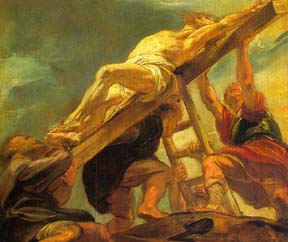 It is through the cross that our sins are forgiven and we are brought into right relationship with God. It is through the resurrection of Jesus Christ that we are given the hope of eternal life with God. May the death and resurrection of Jesus Christ shape and transform your life that you will have a passion for the good news that God has given us in Christ Jesus our Lord.
It is through the cross that our sins are forgiven and we are brought into right relationship with God. It is through the resurrection of Jesus Christ that we are given the hope of eternal life with God. May the death and resurrection of Jesus Christ shape and transform your life that you will have a passion for the good news that God has given us in Christ Jesus our Lord.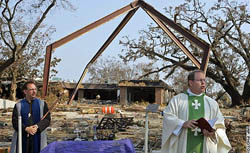 A new blog called
A new blog called  Once one settles down, there is the boredom that sets in with nothing to do. Without distractions of radiom TV, or the Internet, one begins to think of things to do to occupy one's time. Jacki, one of our staff, once commented on the number of people who trim their nails and leave these relics on the carpet. In the mist of this silence and solitude it is quite normal to have the memory become active and events of the past to replay.
Once one settles down, there is the boredom that sets in with nothing to do. Without distractions of radiom TV, or the Internet, one begins to think of things to do to occupy one's time. Jacki, one of our staff, once commented on the number of people who trim their nails and leave these relics on the carpet. In the mist of this silence and solitude it is quite normal to have the memory become active and events of the past to replay. 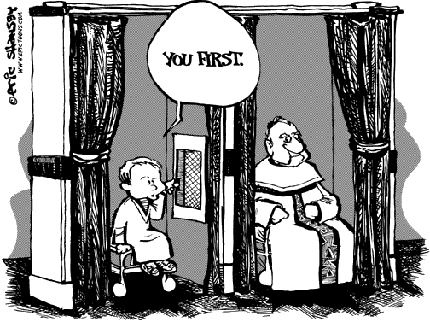
 Our cultural perspective makes it difficult for us to hear this gospel because...our awareness of labor laws and our concern for wages disposes us to focus on the workers in the parable and on the manner of payment. But this is a parable about "the kingdom of heaven" (20:1), not about first century labor practices. What can we learn by focusing on the "kingdom" aspects of the parable?
Our cultural perspective makes it difficult for us to hear this gospel because...our awareness of labor laws and our concern for wages disposes us to focus on the workers in the parable and on the manner of payment. But this is a parable about "the kingdom of heaven" (20:1), not about first century labor practices. What can we learn by focusing on the "kingdom" aspects of the parable?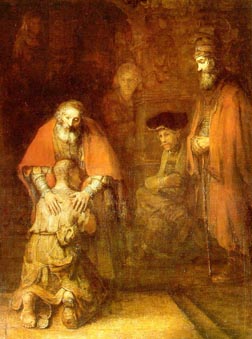 Father, I let go of all resentments and bitterness stored up in my heart. Wash me clean. Forgive me for all the condemning judgements I have made. Give me a new and right spirit that will help enable me to hate sin but look with Your compassion and love upon sinners. Heal the wounded heart of the child within me. Pour Your love in. Bless those who wounded me.
Father, I let go of all resentments and bitterness stored up in my heart. Wash me clean. Forgive me for all the condemning judgements I have made. Give me a new and right spirit that will help enable me to hate sin but look with Your compassion and love upon sinners. Heal the wounded heart of the child within me. Pour Your love in. Bless those who wounded me.

 Problem was that until the Pope spoke few people outside the inner circle knew that a convention of Beelzebub-busters was going on, presumably in Rome.
Problem was that until the Pope spoke few people outside the inner circle knew that a convention of Beelzebub-busters was going on, presumably in Rome.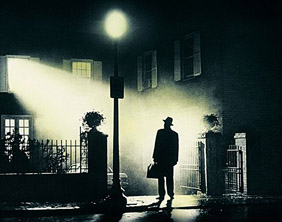 When I was in seminary, a New Testament professor from Taiwan told me a classmate of his was growing a large church in that country through the ministry of exorcisms. It was a ministry his classmate did not even believe in until he found himself called to do an exorcism and was led by a lay person who had battled evil spirits before. The classmate could only report that while not all epileptics and persons suffering from mental illness, etc. need exorcisms, there is a need to pray ourselves of the demonic.
When I was in seminary, a New Testament professor from Taiwan told me a classmate of his was growing a large church in that country through the ministry of exorcisms. It was a ministry his classmate did not even believe in until he found himself called to do an exorcism and was led by a lay person who had battled evil spirits before. The classmate could only report that while not all epileptics and persons suffering from mental illness, etc. need exorcisms, there is a need to pray ourselves of the demonic. Amongst all this, people have kept their sense of humor. It is a remarkable human gift to make light of what can’t be changed. Here are some examples:
Amongst all this, people have kept their sense of humor. It is a remarkable human gift to make light of what can’t be changed. Here are some examples:  You are probably either very spiritual or needlessly paranoid about "the man", like most hippies, as a result of your focus on intuition and feelings over cold, brutal logic. You are also very, very social. And like any hippie, who would have no qualms about hitchiking across the country just to meet some interesting people, you too love to interact with others, even complete strangers. Because we know most any hippie is peace-loving and humble, it stands to reason that you, as well, are terribly gentle and humble, almost to the point of revulsion. Your carefree attitude of peace and harmony is probably very, very sickening to realists or cynics or anyone who isn't a hippie, to tell the truth. In short, your personality is defective because you are overly emotional, extroverted, gentle, and humble--thus making you an annoying hippie.
You are probably either very spiritual or needlessly paranoid about "the man", like most hippies, as a result of your focus on intuition and feelings over cold, brutal logic. You are also very, very social. And like any hippie, who would have no qualms about hitchiking across the country just to meet some interesting people, you too love to interact with others, even complete strangers. Because we know most any hippie is peace-loving and humble, it stands to reason that you, as well, are terribly gentle and humble, almost to the point of revulsion. Your carefree attitude of peace and harmony is probably very, very sickening to realists or cynics or anyone who isn't a hippie, to tell the truth. In short, your personality is defective because you are overly emotional, extroverted, gentle, and humble--thus making you an annoying hippie. 

 Last month, after
Last month, after  Making connections is also what Christianity is all about. For in getting connected to God, we can't help but be drawn closer to the others whom God loves (and that's everybody). We learn that that which connects us is greater than that which seems to separate us. It is natural for Christians to care about soldiers serving in Iraq and families suffering in the wake of Hurricane Katrina and anyone else in need of God's loving care.
Making connections is also what Christianity is all about. For in getting connected to God, we can't help but be drawn closer to the others whom God loves (and that's everybody). We learn that that which connects us is greater than that which seems to separate us. It is natural for Christians to care about soldiers serving in Iraq and families suffering in the wake of Hurricane Katrina and anyone else in need of God's loving care. 
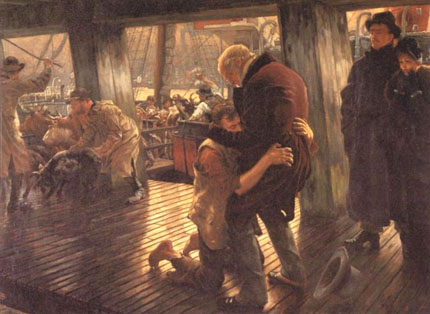
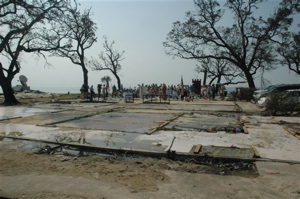
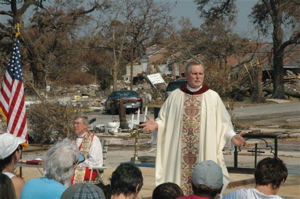
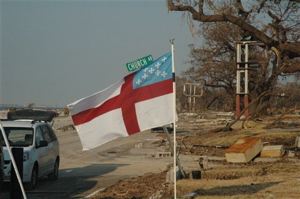
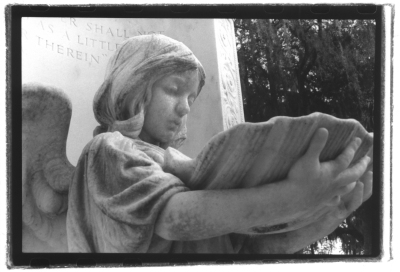
 Our state has experienced a natural disaster of unprecedented proportions. Long time residents of the Mississippi Gulf Coast have noted that the damage and facilities from the storm will far exceed that of Hurricane Camille in 1969.
Our state has experienced a natural disaster of unprecedented proportions. Long time residents of the Mississippi Gulf Coast have noted that the damage and facilities from the storm will far exceed that of Hurricane Camille in 1969.








1 Comments:
At 9/30/2005 9:36 AM, Thumper said…
Thumper said…
Interesting...I had forgotten the trip is not over after metamorphosis! Every time my car hits a butterfly, I cringe. Smile here. Then I remembered in my youth I traveled extensively as if looking for something and experiencing things. I always had to be moving, doing something different; not sitting in the same place too long. Then I found him. I married him. I settled down. Not resolved to stagnate; but travel with my partner. Interesting...
Post a Comment
<< Home